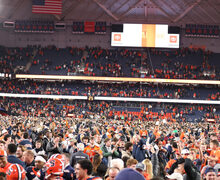Iliass Aouani on coronavirus in Italy, breaking records and his SU career
Emily Steinberger | Design Editor
Iliass Aouani was named to the All-ACC team seven times during his Syracuse career.
This wasn’t how Iliass Aouani’s season was supposed to go.
“Right now, what day is it today? Wednesday? Right now, we would’ve been at (the) Syracuse airport to go to Stanford to try and break (my) 10k (Atlantic Coast Conference) record again,” Aouani said. “But that didn’t happen.”
Aouani, a graduate student distance runner from Milan, Italy, had exhausted nearly all of his eligibility, sitting out the cross country season and running unattached during the indoor portion of the track and field season. But he was eligible to run for Syracuse in outdoor track before the outbreak of the novel coronavirus cut the season short.
Even after the NCAA canceled the remainder of spring sports, Aouani couldn’t go home to see his family like the rest of his teammates. His hometown of Milan, Italy is one of the early epicenters of COVID-19 in Europe, and the country has been on a nationwide lockdown since March 9 — three days before the NCAA’s announcement.
From his South Campus apartment, Aouani spoke about his family’s situation back home, the “what ifs” from his shortened season and his illustrious Syracuse track and field career, in which he won two ACC championships and was named All-ACC seven times.
The Daily Orange: Being from Italy, when did you realize that coronavirus was going to be a big problem?
Iliass Aouani: I thought it was going to be a big deal just in the past month, to be honest. The progression was kind of slow (at first), but then started speeding up. I was getting worried for the situation in Milan because I didn’t expect that. I didn’t expect it to get to this point. I think just the week before spring break was when I was like, “OK, so this is serious.”
D.O.: What have your conversations been like with family and friends at home?
I.A.: I call my parents every day and hear from my friends as well. They were very pessimistic. They would say the situation is really bad back home. I was worried for them a few weeks ago, but now they are worried for me because of the (positive cases) numbers we’re getting in New York. I think we are in the same boat because I’m worried for them because they have a lot of deaths in Italy. And they are worried for us because we have a lot of cases here.
The area where I’m from, Milan, has been subjected to more restrictive measures (than Syracuse). They’ve been under a really strict regime, and it’s not the same thing I’ve been seeing here in Syracuse, of course. Milan and Syracuse are different cities. I’ll talk to my mom, and she will tell me they haven’t left the house in days. My sister hasn’t stepped out of the house in a month.
D.O.: How difficult has it been not being able to go home during all of this?
I.A.: Yeah, it is really tough. If I think about it, it is pretty worrisome. But at the same time, I try to not think about something I can’t control right now. I just focus on what I can do and try to keep a good attitude. It’s not easy to stay here by yourself and keep the same rhythm and the same pace as you would do in normal situations. Worrying is not going to make the situation better, so I just try to not think about it because anything can happen in these situations.
D.O.: What have you been up to during quarantine?
I.A.: I’ve been keeping myself busy with school, homework, reading, studying, working out. I try to keep my mind and my body active because that’s the best thing you can do in this situation. I’m keeping myself fit with a lot of core, strength work. I’m not currently running, not because of the virus or the quarantine, but I had an injury (femur stress fracture). If I had to choose, I would never get injured, but, like, if there was an option to pick when, this is perfect timing.
D.O.: Do you remember the moment when you found out the season was over?
I.A.: I wasn’t with the team, but I got a text from (SU head coach Brien Bell) saying, “Season is over. We can get together to talk. There’s a lot to talk about.” It was frustrating. I spent all these months thinking about the first day I’d wear orange. This year we had big things in mind. We had big goals. Seeing all the hard work that we put in vanish like that was a bit frustrating, I’m not going to lie. We really had high ambitions. But at the same time, there’s some higher powers that you can’t fight, so we have accepted it. Everybody’s in the same boat, so you don’t feel too bad about yourself.
D.O.: You mentioned your preparation for this season. How was it different to what you’d done in the past?
I.A.: I did some workouts I had never done in my life. I was super fit. I was doing really hard long runs, really hard tempos. My sessions were really good, to be honest. I couldn’t race during the fall, but I still ran unattached at the 5k indoor (season-opener) in Boston. Without doing a lot of speed work, I ran a 13:35 (a would-be Syracuse school record). The hard work was there. Mileage was high, strength work was quality and the intensity of the workouts was high. That’s why I was able to run like never before.
During the fall, I would keep a 4:50 (mile) base the entire way. My 19-mile long runs would be 5:15, 5:20 minutes per mile pace, which is really good. I remember a good workout I did was four times a mile. I ran all of them in 4:24 or under. I just came back really strong this indoor season. We would run six-mile tempos at 4:50 (mile pace), and that would feel really comfortable. Then we would run two 800s (meters) in 2:05 or 2:03. I remember doing this.
D.O.: And that led you to a strong performance in your first race back.
I.A.: During the 5k, I hadn’t expected to run that fast. I hadn’t raced in a while. I wasn’t feeling like I was on that level. But the day that I ran that time, with that as my (season) opener, I was like, “Wow, if I am at this point now at my first race, I can’t imagine in two or three months when I’ll have to run in Stanford.” So, that gave me huge confidence in myself, really big momentum, and I was really excited to get back to race.
D.O.: That momentum led you to break the Italian mile record several weeks later at the David Hemery Invitational. What was that like?
I.A.: One side was good satisfaction, but I was a bit upset because I almost broke four minutes. That was my first time (running a competitive mile). So, considering that and it was my first experience, I didn’t know what to expect. With three laps to go, I had an unfortunate collision with a runner in front of me that made me lose momentum, and it blocked me in the head too. That stuff definitely made a difference because I didn’t make four minutes by seven-hundredths of a second. But I know I can run sub-four, and that’s what matters. That was a good confidence boost for me too because it gave me the proof I can run fast in short races, and I can run fast in longer races.
D.O.: You also set the ACC 10k record last season, along with winning gold at ACC Championships, but your ultimate goal has always been to win at the NCAA Championship. Did you feel like that was possible this season?
I.A.: For sure, I had that kind of mindset. I was aiming for the podium at the NCAAs. The training I was doing was to get on the podium. I had big ambitions this year. And of course, we had even bigger dreams related to the Olympics as well. (Running for Italy) was one of the goals, of course. It was going to be hard, but we were still working for it. I felt I had a chance, but I would need a lot of luck. I knew that. I was conscious of the fact that it wasn’t granted (to me), but I was still working for it. I was just using that as a target. I like the idea of getting motivated by something huge like that because … you get really excited about something like that.
D.O.: You’ve had a career with a lot of ups and downs: transferring from Lamar, injuries, setting records. Now the season is canceled. If you have run your last collegiate race, how do you reflect on your career?
I.A.: Your growth as an athlete is never linear. Of course, you have ups and downs for any kind of reason. Stuff happens, and you need to get adapted to a new routine. Maybe something happens in your personal life and you gotta deal with that as well. There’s so many external factors that affect your progression as an athlete. I think in your mind, keeping the right attitude to get you through a hardship, and knowing the best of you comes in these hard times. I feel like the times where I wasn’t confident about myself, those times, of course, have shaped me and made me the athlete I am today. They have shaped my mind more than my body, to be honest. For example, I had this kind of injury three years ago, and three years ago I wasn’t dealing with it the way I’m dealing with it now. Three years ago I was really feeling the weight of this injury in my head, whereas now I’m feeling I can come back stronger. That’s a symptom of maturity, I think.
So, I’m happy with it. I have some regrets, but those regrets have been really helpful for me to appreciate what I have accomplished after those times.
Published on April 2, 2020 at 10:32 pm
Contact Alex: athamer@syr.edu






